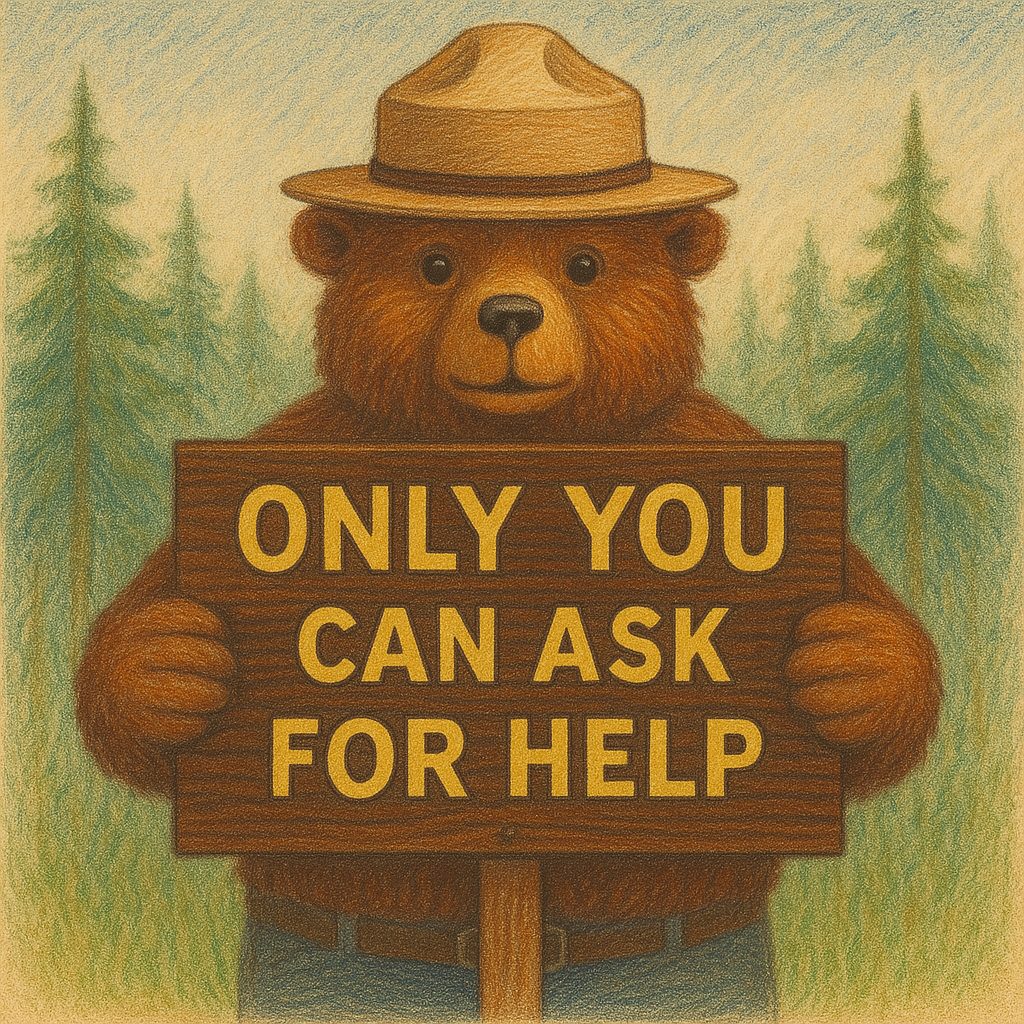When Smokey Bear said “Only YOU can prevent forest fires,” he wasn’t just talking about campfire safety. He was talking about personal responsibility. Today, I want to share a different but equally important message with every first responder reading this: Only YOU can ask for help.
Just like preventing forest fires starts with individual action, your journey through trauma recovery begins with a single, powerful decision that only you can make.
Why You Must Take the First Step
As first responders, you’re trained to run toward danger, to help others in their worst moments, and to be the solution when everything else fails. But when it comes to your own struggles, that same training can work against you. You might think you should handle everything alone, that asking for help shows weakness, or that others have bigger problems than yours.
The truth is, you can work through the aftermath of traumatic experiences, but you don’t have to do it alone. Think of it like fighting a fire. You need to be the one to make entry, but you always have a crew backing you up, and you’ve got resources ready if you need them.
Only you can recognize when the weight in your duffle bag of memories has become too heavy. Only you can decide when it’s time to start unpacking those experiences in healthy ways. And only you can reach out and say, “I need some backup here.”
Building Your Support Network
Your support network isn’t just one person or one resource. It’s like a multi-layered response system, each level serving a different purpose:
- Your Family and Friends
Keep an open mind about their ability to help. You don’t need them to understand every medical protocol or tactical procedure. Let them support you in the ways they can. They understand grief, frustration, and feeling helpless, even if they don’t understand the technical aspects of your job. - Your Peers
Other first responders who truly “get it” can provide understanding that others might not. They’ve carried similar weights in their own duffle bags. But remember, peer support works both ways. Sometimes you’re receiving it, sometimes you’re providing it. - Professional Resources
Just like you’d call for additional resources at a major incident, sometimes you need professional backup. It’s okay to recognize that some situations require specialized expertise.
When to Call for Professional Backup
You know that feeling when you’re on a tough call and you hear incoming sirens? That relief knowing backup is coming? That’s exactly what reaching out for professional help feels like.
Consider professional support when:
- You feel stuck and can’t move forward
- You don’t feel like yourself anymore
- Your loved ones notice changes in you
- Sleep, appetite, or mood patterns have shifted significantly
- You’re using alcohol or other substances to cope
- You’re having thoughts about ending your life
The Relief of Backup Arriving
When you finally make that call for help, whether to a friend, family member, or professional, you’re likely to feel a sense of relief. It’s the same feeling you get when additional units arrive at a major incident. You’re still handling the situation, but now you have the resources you need.
Professional counselors, especially those who specialize in first responder mental health, understand your world. They know about shift work, hypervigilance cycles, and the unique stresses of your profession. They can help you unpack that duffle bag of memories in ways that don’t overwhelm your system.
Therapies like EMDR (Eye Movement Desensitization and Reprocessing) can help your brain properly file away traumatic memories that got stuck during high-stress situations. Think of it as helping your brain complete the filing process that was interrupted when trauma bypassed your normal processing pathways.
Walking the Path with Others Beside You
Your recovery path might include:
- Learning new coping strategies that work with your lifestyle
- Processing specific incidents that have stuck with you
- Developing better ways to communicate with family about your experiences
- Building resilience across all four domains: physical, emotional, mental, and spiritual
Viktor Frankl put it this way, “Between stimulus and response there is a space. In that space is our power to choose our response. In our response lies our growth and our freedom.” Getting help gives you more tools to use in that space between what happens to you and how you respond.
Taking Action Today
If you’re reading this realizing you need help, here’s what you can do right now:
- Start somewhere
You don’t have to solve everything at once. Pick one person to talk to, one habit to change, or one resource to explore. - Remember your “why”
Think back to why you became a first responder. That purpose hasn’t changed, but taking care of yourself ensures you can continue fulfilling it for years to come. - Practice asking for help
Like any skill, asking for help effectively takes practice. Be specific about what you need instead of being vague. - Access Professional Resources
Visit our Resources Page for resources, including counselors and phone numbers, you can reach out to for assistance.
Just like Smokey Bear’s message about fire prevention, this responsibility starts with you. But unlike preventing forest fires, which you often do alone, recovering from trauma and building resilience works best when you have the right support team beside you.
Your willingness to ask for help isn’t just about you. It’s about the people who count on you, the community you serve, and the colleagues who look up to you. When you take care of yourself, you’re modeling healthy behavior for others who might be struggling in silence.

